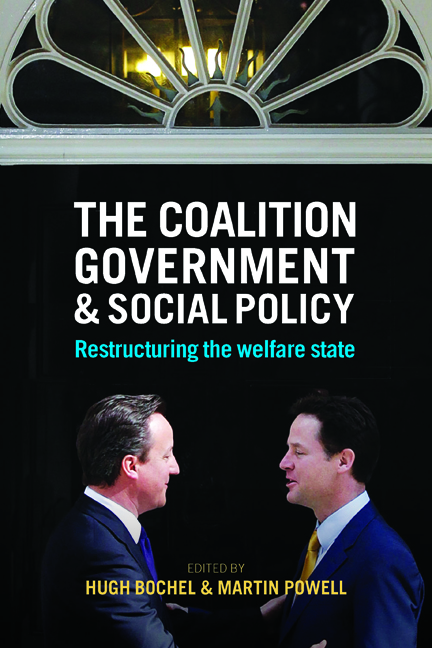Book contents
- Frontmatter
- Contents
- Notes on contributors
- One The transformation of the welfare state? The Conservative–Liberal Democrat coalition government and social policy
- Two The coalition government, public spending and social policy
- Three The changing governance of social policy
- Four The coalition, social policy and public opinion
- Five Health policy and the coalition government
- Six The coalition government, the general election and the policy ratchet in education: a reflection on the ‘ghosts’ of policy past, present and yet to come
- Seven Coalition housing policy in England
- Eight Social security under the coalition and Conservatives: shredding the system for people of working age; privileging pensioners
- Nine Welfare and active labour market policies in the UK: the coalition government approach
- Ten ‘It ain’t what you do, it’s the way that you do it’: adult social care under the coalition
- Eleven Family policy: the Mods and Rockers
- Twelve One step forward, two steps back: children, young people and the Conservative–Liberal Democrat coalition
- Thirteen The coalition and criminal justice
- Fourteen Equalities: the impact of welfare reform and austerity by gender, disability and age
- Fifteen Social policy, the devolved administrations and the UK coalition government
- Sixteen Conclusions
- Index
Three - The changing governance of social policy
Published online by Cambridge University Press: 01 September 2022
- Frontmatter
- Contents
- Notes on contributors
- One The transformation of the welfare state? The Conservative–Liberal Democrat coalition government and social policy
- Two The coalition government, public spending and social policy
- Three The changing governance of social policy
- Four The coalition, social policy and public opinion
- Five Health policy and the coalition government
- Six The coalition government, the general election and the policy ratchet in education: a reflection on the ‘ghosts’ of policy past, present and yet to come
- Seven Coalition housing policy in England
- Eight Social security under the coalition and Conservatives: shredding the system for people of working age; privileging pensioners
- Nine Welfare and active labour market policies in the UK: the coalition government approach
- Ten ‘It ain’t what you do, it’s the way that you do it’: adult social care under the coalition
- Eleven Family policy: the Mods and Rockers
- Twelve One step forward, two steps back: children, young people and the Conservative–Liberal Democrat coalition
- Thirteen The coalition and criminal justice
- Fourteen Equalities: the impact of welfare reform and austerity by gender, disability and age
- Fifteen Social policy, the devolved administrations and the UK coalition government
- Sixteen Conclusions
- Index
Summary
Introduction
In recent decades, we have become more aware that the ways in which policies are formulated, implemented and evaluated can, in many respects, be as important as the policies themselves, and this has been particularly evident in social policies, particularly from the 1980s onwards. Under successive governments, we have seen considerable continuities in the ways in which social policies have been made and implemented, with, for example, broad preferences for markets and competition as ways of delivering services, together with a shift in responsibility from the state towards individuals and families, and, perhaps to a more limited extent, communities. However, there have also been some differences in emphasis, perhaps most obviously in Labour's greater willingness to increase public expenditure on public services from 1997 until the financial crisis of 2008, and in the introduction of devolved legislatures for Northern Ireland, Wales and Scotland under the Labour government, which, to some extent, ran counter to the centralising tendency of much of the period since 1979, and which, in turn, allowed for a potentially greater diversity of approaches across the UK, as discussed in Chapter Fifteen.
Prior to the 2010 general election, both the Conservatives and Liberal Democrats had developed a variety of proposals that might have been expected to impact upon the ways in which social policy is made and delivered. For the Conservatives, those included changes to the ways in which legislation passes through the House of Commons (such as a Public Reading Stage for bills), some devolution of power to local authorities (although, at the same time, proposing to allow local residents to veto high council tax rises), reducing the number and power of quasi-autonomous non-governmental organisations (quangos), replacing the Human Rights Act with a Bill of Rights, and emphasising a significant role for voluntary and community groups, rather than the state, in the provision of social policy. Among the Liberal Democrats’ proposals were support for mutuals, cooperatives and social enterprises, a ban on politicians being involved in the day-to-day running of schools, and changing the electoral system. The Programme for government negotiated by the two parties included a number of proposals drawn from the manifestos of the two parties (Cabinet Office, 2010).
- Type
- Chapter
- Information
- The Coalition Government and Social PolicyRestructuring the Welfare State, pp. 53 - 78Publisher: Bristol University PressPrint publication year: 2016



